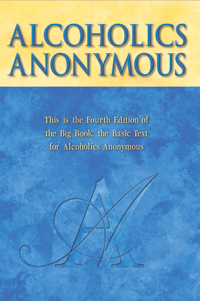

 |
Foreword to the First Edition |  |
This very short introduction to the book and fellowship of Alcoholics Anonymous manages to cover a lot of ground.
The first paragraph contains a brief description of the fellowship and a statement of purpose, both of which use the term 'recovered'. This is the most common term used throughout the literature for the solution to the alcohol problem, though other terms are also used. Use of 'recovered' reflects the then-new idea that alcoholism is a disease, not a failure of will power or moral values.
The authors next explain the reason the small, fledgling society decided to remain anonymous - concerns of being unable to handle a possible deluge of requests for help. The sole method of contact set up for the general public was a PO Box in New York. The press is asked to accommodate the wishes of the group in this matter. The still-common idea that alcoholism was a moral or character issue motivated some of the pioneers' desire for personal anonymity. (See Pass It On, Page 307)
Individuals in the fellowship are asked to maintain anonymity as well, even though some may not have had such reservations. Even at this early date the perils of personal fame may have been known to the pioneers. Personal anonymity is one of several ideas behind Traditions that can be found in this book years before the latter were published.
The authors express an eagerness to hear from those who have read the book and have gotten results. After all, the book was intended as a resource for alcoholics who would not be in personal contact with other members, and was thought to be sufficient for the purpose of recovery (see page 162-3). For example, the First Edition contains the personal story Lone Endeavor, in which a man reads the manuscript of Alcoholics Anonymous, follows its suggestions, and gets sober as a result. He wrote to the Alcoholic Foundation (as it was then known) in time to have his story included when the book was first published.
Inquiries from medical and religious societies are encouraged, an exchange that still continues to this day in the form of Cooperation with the Professional Community committees at the National, Intergroup and Area levels in Alcoholics Anonymous.
There is no mention of the Oxford Group or its role in the creation of Alcoholics Anonymous. The likely reason is that by the time of the Big Book, the Oxford Group had become involved in political controversy. Other possible reasons are a desire to avoid the appearance of affiliation with any religious organization, and growing differences between A.A. and the Oxford Group. (See Dr. Bob and the Good Old Timers, Page 155)